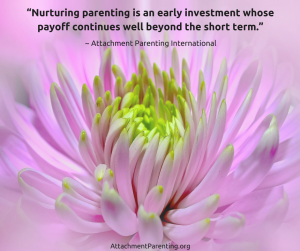Much talk surrounding the foundations of a robust national economy ignores the role of healthy families, especially those in which one parent may not participate full time in the paid workforce.
 University of Chicago (U.S.) economist James Heckman, however, is known for his research into how a nation that invests in policies that promote healthy families is investing in its future economy. While he supports expanding early child care and education programs, he does not disregard the critical value of a healthy childhood environment in the home.
University of Chicago (U.S.) economist James Heckman, however, is known for his research into how a nation that invests in policies that promote healthy families is investing in its future economy. While he supports expanding early child care and education programs, he does not disregard the critical value of a healthy childhood environment in the home.
Related: API’s Eight Principles of Parenting – Provide consistent and loving care
This Q&A-style article from AEI dives headlong into Heckman’s research-backed support for family-based, healthy child development in light of overcoming inequality and facilitating social mobility, reducing the need for government-sponsored welfare programs, and empowering the next generation of workforce. Heckman’s ideas are an unique approach to typical economy-strengthening discussions. Here are some takeaways:
- Conditions that each person is born into plays a fundamental role in the trajectory of that person’s life. This goes beyond genetics and encompasses even what happens earlier in the family tree before his/her birth.
Related: Historical trauma, breastfeeding, and healing with Camie Jae Goldhammer
- Biological brain development may be at the core of child development, but which way that brain development goes depends on that child’s interaction with parents, siblings, other people and society. Families can nourish brain development. They can also suppress it.
Related: For better or worse, parenting changes your child’s DNA
- Nourished brain development creates a foundation of early skills that facilitate the accumulation of skills (learning) through life – through education, interaction with others, work experience, etc. Among these early skills are self-control, perseverance, and the ability to guide oneself. Once a person has these skills, it’s easier for him/her to learn and gain other skills. A good start to a life is almost self-propelling.
Related: Nurturing doesn’t spoil kids
- While the brain never loses the ability to learn, it’s much harder the older you get. Babies learn the easiest, so that’s where the investment into his/her life has to happen because that’s what is setting the foundation of his/her life. This is not something you can hold off on and come back to later; if a baby doesn’t get the right foundation, he/she can still learn when older but it will be much harder because the foundation is shaky.
Related: Dear little me, a letter from my grownup self
- Research is seriously lacking in the economic returns of a family’s impact on child outcome. Research shows high returns (13% per annum) on early childhood programs, but Heckman predicts that the returns on a healthy family’s impact on child outcome would far outpace (an estimated 30-40%) that of early childhood programs. Early childhood programs are only successful when they “turn on” the parents – the program empowers the parents, the parents get engaged. Reaching the mother, specifically, is the key.
Related: What really matters when it comes to daycare
- Parent education and support are important for all families, though the disadvantaged will accrue the most benefits. What defines advantages in parenting? Rather than higher income, good parenting involves attachment, interaction, and engagement with the child – this is what builds the foundation of learning starting in infancy.
Related: A need for paid parental leave
- When considering universal child care, especially in a society where mothers are encouraged and expected to work full time outside of the home, there is real danger of high-quality parenting being replaced by mediocre child-raising in child care centers. This has happened in Canada and elsewhere. Our society has to guard against this.
Related: Parental presence, real-life
- While some high-quality child care programs are very generous in their investment into the child’s future, child care centers can’t compare to the value of a parent in that child’s life. The key is to support parents to provide the home life that best supports their children.
